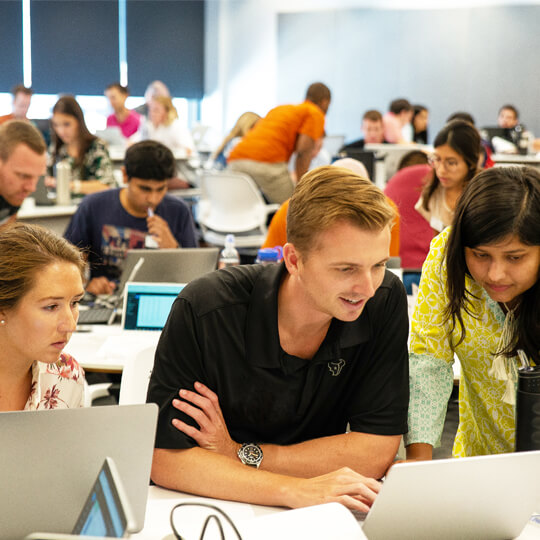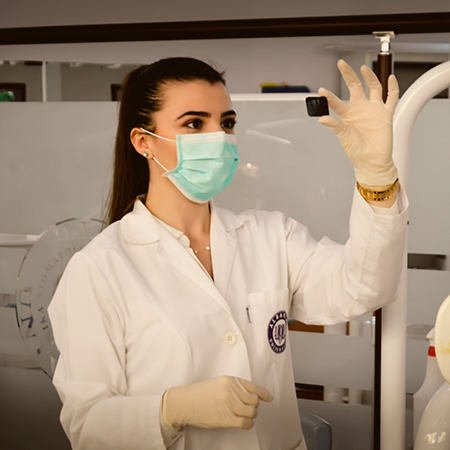
HEALTH CARE WITH AN MBA MINDSET
The perseverance, business skills, and power of inquiry honed in the MBA program are highly valued in today’s health care industry, driving innovation through the entire health ecosystem.
THE MBA HEALTH CARE CORE
Health care is a rapidly expanding field with many entry points for a graduating MBA student. The MBA Health Care Series will give you the specialized knowledge you need to step into a satisfying career with growth potential.
MAN 385: The Health Care Business Ecosystem
This course introduces students to the business ecosystem of the US health care industry using a multi-disciplinary approach to investigate the business structures, processes, and outcomes of health services in America. The course covers how various health care components - including biotech and pharma - work individually and how they work (or fail to work) together to create the "health care system."
MIS 382N: Healthcare Technology Innovation
This course focuses on studying product and process innovations in the healthcare industry driven primarily by advances in information technology. The primary objectives are to help students understand evolutionary changes within the healthcare value chain, develop technology strategies to foster innovation, and evaluate how new information technologies can disrupt the healthcare delivery lifecycle.
PGS 380M: Health Innovation Dexterity
The third course, Health Innovation Dexterity (PGS380M) has been approved by the College of Pharmacy and is in the process of being added to the University’s Course Inventory. The exponential advancement of new technologies is reshaping the workforce. The Future of Jobs Report from the World Economic Forum (9) estimates that more than one-third of current ‘essential job skills’ will change as artificial intelligence and bots continue to expand in the workplace. Preparing our students for what is being termed the ‘Fourth Industrial Revolution’ is addressed in this workshop series. Industry and innovation leaders share how to prepare and the skills needed to be successful and competitive in the future workplace, expanding on facets of creativity, communications, emotional intelligence, critical thinking, decision making team dynamics, active learning, and sustaining an innovation mindset. The course is formatted as a series of topics, presented in an interactive workshop, an effective way for students to learn and practice the knowledge and leadership skills for being workforce-ready, whether they will be participating in startups, working in a private practice, or joining an established organization.
PGS 383M: Health Innovation Entrepreneurship
In this course, students propose and select student-led projects that are the centerpiece of the practicum. The practicum allows students to apply the fundamentals to student-led health innovation projects. Using a flipped-classroom approach, online class time is focused on team-based business planning and highly interactive discussions. Each learning module steps teams of students through the development of critical elements including:
- product description
- competitive analysis
- the Value Proposition canvas
- regulatory considerations
The strategies for developing a product’s IP strategy, target market, regulatory approach, and funding options are amplified through interactions with a network of innovators, entrepreneurs, and business leaders who participate in the course and share their experiences, challenges, and successes with the students. Guest speakers are invited to join each class session, providing an opportunity for students to learn, interact, and connect with experienced health innovators. Practicum projects range from discovery and development of new medicines, novel delivery systems, and groundbreaking devices to health-promoting digital applications, surgical tools and more efficient and secure approaches for dealing with medical data. The culminating ‘power pitch’ event brings together leaders from academia, medicine, business, and financial sectors who judge the presentations and provide valuable feedback to the teams. Class projects have led to spinout companies, internships, and important mentor-funding opportunities.
PGS 389M: Fundamentals of Health Innovations
This course introduces foundational innovation and entrepreneurship concepts to understand the process of developing novel drug therapies, medical devices, diagnostics, and digital health products and services. Students learn about development pathways and how health innovations move from idea to a commercial product or service and tracking the journey of already marketed products that illustrate the various steps, approach, and challenges. Topics include
- learning the product development pathways: drugs, devices, digital
- delineating the health innovation pipeline
- incorporating design thinking for health innovations
- understanding stakeholder needs
- conducting effective customer discovery
- considering payers and reimbursement
- protecting intellectual property
- navigating regulatory environments
- fundraising
- practicing effective team skills
At the conclusion of the course, students gain foundational knowledge of new health product technology development and be equipped to assess health innovation opportunities.
Graduate-Level Health Care Accounting
Coming soon.
MBA Health Care Electives
|
INF 385T |
AI in Health (Information) |
|
LAW 395E |
Health Care Law (Law) |
|
LAW 397S |
Health Care Law and Policy (Law) |
|
LAW 397S |
Health, Justice, Race, COVID (Law) |
|
N 381D |
Leadership Development for Health Care Professionals (Nursing) |
|
N 382W |
Informatics for Health Care Professionals (Nursing) |
|
N 386F |
Budget and Finance in Health Care (Nursing) |
|
N 387K |
Leading and Managing Complex Health Care Systems (Nursing) |
|
PA 383C |
Policy Development: Health and Society (LBJ School) |
BECOME A HEALTH CARE INNOVATION FELLOW
Through hands-on exposure to current challenges in the rapidly changing healthcare industry, the Health Care Innovation Fellows help Texas MBAs discover opportunities to impact the future of care positively.


